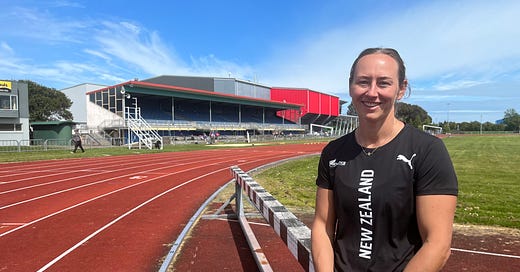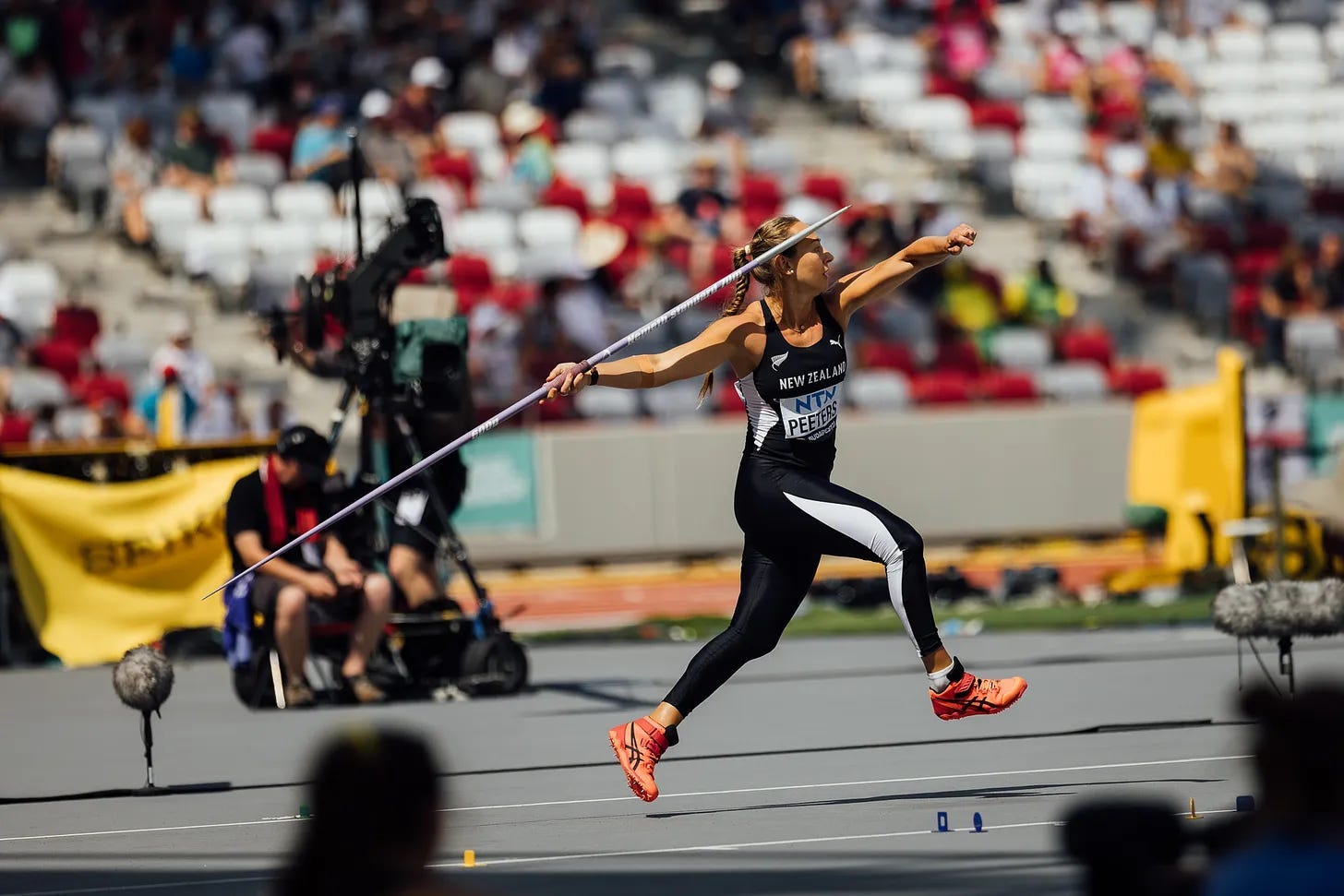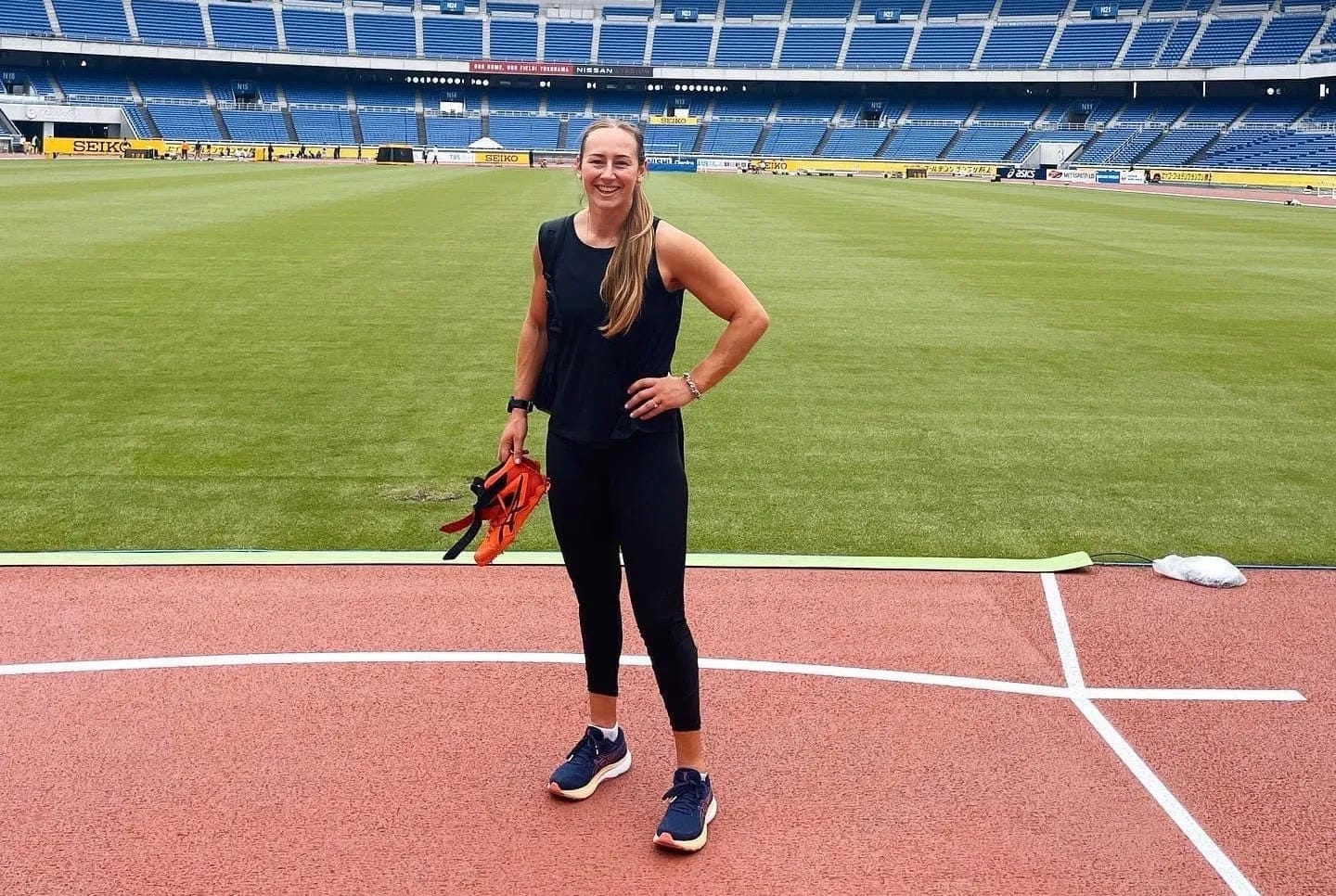Big Read: From winter trainings in Gore to the Olympics
“We had her in football boots with studs because the ground was soft, and we threw right through the winter and that set her up."
Olympic javelin thrower Tori Peeters returned to her provincial roots at the weekend. Logan Savory caught up with Peeters and her first coach Murray Speden to reflect on the ride from Gore to the top.
When you trace Tori Peeters’ journey from javelin novice to Olympian you’ll find the name Murray Speden as the original mastermind.
Peeters herself is quick to acknowledge that.
“I was very fortunate to have Murray. Without Murray I definitely wouldn’t be where I am today, I probably would have just given up,” Peeters says.
Speden was a New Zealand javelin champion. He says 1963 was his “hay-day”, and at one point he held the national men’s record for over a decade.
The Gore man’s passion for the art of throwing a javelin has never waned. He transitioned from competitor to an over 50-year coaching stint that is still going.
Many have thrown a spear under Speden’s watchful gaze, but none have ended up amassing a CV close to what Peeters has.
And even an unassuming retired bloke from Gore struggles to hide his pride in that.
Speden was coaching Peeters’ older sister Stacey - a national age-group champion javelin thrower herself - when Tori joined Speden’s stable of throwers as a teenager.
It took little time for her talent to emerge and the success to start flowing.
“She was gangly with long limbs, but hell she could throw a javelin,” Speden recalls about his initial impressions of Peeters.
“She was better than anyone else in her age-group right from the beginning.”
There were previous throwers that Speden coached and regretted not having put more time into them as he juggled work commitments and other passions, like tramping.
When Tori Peeters’ talent started to shine he vowed that wasn’t going to happen again.
He was retired and ready to give what he could, and Speden was delighted he had an athlete in Peeters who was prepared to endure the grind required for improvement.
After one successful summer competing Speden suggested to Peeters that for her to continue to develop she would need to keep throwing in the winter months.
Peeters was prepared to do just that, but it came with some logistical challenges.
Peeters had plenty of other commitments, including the fact she was a talented netballer, and that she had a bus to catch from Gore back to the family farm near Riversdale each day after school.
It was decided they would train at lunch times through the winter.
“God only knows when she ate,” Speden says about Peeters’ training schedule during her school lunch breaks.
They would meet at Newman Park, close to St Peters College which Peeters attended in Gore.
The issue was they trained on grass in the middle of a Southland winter, with no all-weather athletics track in place.
“We had her in football boots with studs because the ground was soft, and we threw right through the winter and that set her up,” Speden says.
“We still laugh about [the rugby boots].”
Speden was instrumental in Peeters’ early progress but after about four years he felt she had reached the point where he could not take her any further.
“She knew as much as I did and I was no longer teaching her anything, so I said we need to go and get some help.”
That help initially came from Debbie Strange who was based in Waikato and coached leading men’s javelin thrower Stuart Farquhar.
Later it was Raylene Bates in Dunedin, who took charge when Peeters made the shift to study at the University of Otago, and now Kirsten Hellier has the reins.
Most of the javelin throwers that Speden has coached have given the sport up after departing high school, with Peeters an exception .
“Mentally she is really strong, She had made her mind up and she was determined she was going to be a javelin thrower.
“She is really driven and that’s what it takes to get to an Olympics.”
Peeters won her first senior New Zealand women’s javelin title in 2012 and has dominated since.
This year Peeters reached the world’s sports biggest stage when she competed at the Olympic Games in Paris.
There was a long list of Southlanders watching on proudly from home, Speden was at the top of that list.
“It was just unbelievable; there she was on the screen [at the Olympics]. It was pretty special alright. You think about those days of her running around in rugby boots on wet grass in Gore.”
While Speden handed over the coaching reins a while back the pair have remained in touch throughout Peeters’ javelin journey.
“Muzz and I, we catch up often,” Peeters says.
“When I come back from overseas and I’m driving back from Auckland down that expressway to Hamilton he is the first person I call.
“I get on the phone to Murray and I get the 20 questions about what the conditions were like. All the questions.
“So, we have a jav chat for an hour and half until I get back to Hamilton. It’s great.”

Returning to where it all begun…
When Tori Peeters - who is now based in Cambridge - was asked if she would travel south and speak at Athletics Southland’s awards evening on Friday night she jumped at the opportunity.
In fact, she was keen to also stay on and help with some coaching on Saturday at Surrey Park in Invercargill.
“It’s something I’ve always wanted to do, is to come back and give back to the community that has given so much to me. It’s nice to see so many kids here that are keen.
“The thing for me is trying to create a bit more of a profile around athletics and particularly javelin throwing.”
Peeters didn’t have an Olympic javelin thrower show up when she was starting out as a youngster, and she is now keen to show young Southlanders that there is an example that it can be done.
“I was once where they are and standing in their shoes, and here I am now coming back from the Olympic Games, 10 years later. I got there, so it’s possible.”
To add to it all, Peeters got the chance to run the throwing session at Surrey Park on Saturday alongside her old coach - Murray Speden.
Peeters jokes that she now spots some of Speden’s coaching quirks coming out in her when she takes a session with youngsters.
“He’s got my eye for things, and I’ve got my eye for things. I couldn’t help but laugh that we both go watch the throwers technique from behind them rather than side on.
“And I also can’t help but laugh when we go to watch someone throw, we both do this little thing where we throw it with them. Murray has always done it, and I start to do it now.”
Four more years. The shot at LA 2028…
It was a long and bumpy journey for Peeters to get to the Olympic Games in Paris this year.
There were plenty of setbacks to overcome on the over decade long quest to wear the Silver Fern at an Olympics.
You’d think it would take fair bit of pondering before deciding if Peeters had another four-year campaign in her.
Afterall, she has already achieved something only a very select few in the world have got to do by competing at an Olympics.
But the 30-year-old admits the decision-making process was a fast one after Paris. She has unfinished business to sort.
“For me it was a pretty quick decision. I didn’t run it past the fiancé but he was super supportive.”
“As soon as I didn’t make that final I thought; ‘right, LA is on the cards’.
“I’d made Paris and that was awesome, but by no means had I achieved my goal.
“I set out to be in that final and I knew I was capable of being on that podium, and the distances said that.
“You look at those girls that were on the podium, I needed 20cm on my personal best to be on the podium. It is sitting right there for the taking.
“It was a pretty hard pill for me to swallow, but that is sport. You have got to show up on the day and qualifying is really difficult. Everybody has got to bring their A-game in three throws.”
At 30-years-old Peeters still feels she has time on her side.
“Some people may think 30 is old but with javelin throwers, there are plenty of people on the circuit now that are in the mid-30s, even at the end of their 30s, throwing exceptional.
“Some of them are throwing lifetime bests, so there is longevity in this event if you can look after your body.
“I’m 100% committed to another four years.”
Peeters also feels she will be better for the trip to Paris, learning plenty about the Olympics experience in regard to the village life and everything that goes with it.
Peeters returned to training this week, although says she will be pretty quiet on the competition front for a while. She probably won’t again until the nationals late in the season.
It’s been a busy period of preparing for and performing at pinnacle events and Peeters is keen to have a decent training block where the focus is on the technical form of her throw.
“I really want to take some time - like a solid six months or so - to try really nail and dial into a couple of technical things that we see as a huge work on for me.
“We know if I’m throwing 60-odd metres off the block now, that has got a few flaws in it, then if I can straighten that up and improve that then there’s some metres to be made.”
Being an Olympian is not full of glamour …
Signing up for another four-year Olympic Games quest isn’t just a physical and mental challenge for New Zealand’s leading women’s javelin thrower.
Peeters has a challenge ahead of herself to stack it all up financially to give herself the best shot at LA in 2028.
At this point of time, she is going into the next four-year cycle without any sponsors on board.
She had a crew of sponsors in the lead up to Paris to help get her to events and allow her to scale back work commitments to focus on her sporting endeavour.
She is starting from scratch again on that sponsorship front, and these some doubt around what High Performance Sport NZ funding will be available.
“Unfortunately, with the High Performance [Sport NZ] funding strategy, it’s changing and it’s looking like it will be a little bit more difficult for me to receive funding, so I know that that poses a challenge.
“So, for me for the next four years could be a bit trickier that what I anticipated, but I’m for the challenge.
“If anyone wants to sponsor me then that would be great,” Peeters says, not missing an opportunity for a sponsorship pitch.
She says she will find a way to make it work, which may include juggling a 40-hour a week job around her Olympic sporting quest.
“My whole career I’ve worked a part-time job, whether it has been 40 hours a week, 30 hours a week, 20 hours a week, or this year I was lucky enough to work 10 hours a week, which was amazing.
“It meant that I could prepare for the Games the way I wanted to, and I had enough support behind me to do that which was great.
“But if it means going back to 40-hour working week as well as training then that’s what it’s got to be.”










It was great to meet Tori at the athletics awards evening and to hear her inspirational story.
It's wonderful to see a veteran like Murray Speden still contributing to his sport, and even better that young people are taking the opportunity to benefit from his knowledge. One of the continuing frustrations with New Zealand sporting development is the failure to learn from those who have been there and done that. It is prevalent across all New Zealand sports and is a hindrance to achievement. Too much valuable time is spent reinventing the wheel and not advancing skills on the shoulders of those who know. In smaller communities that is especially the case and this story offers positive encouragement that all is not lost.